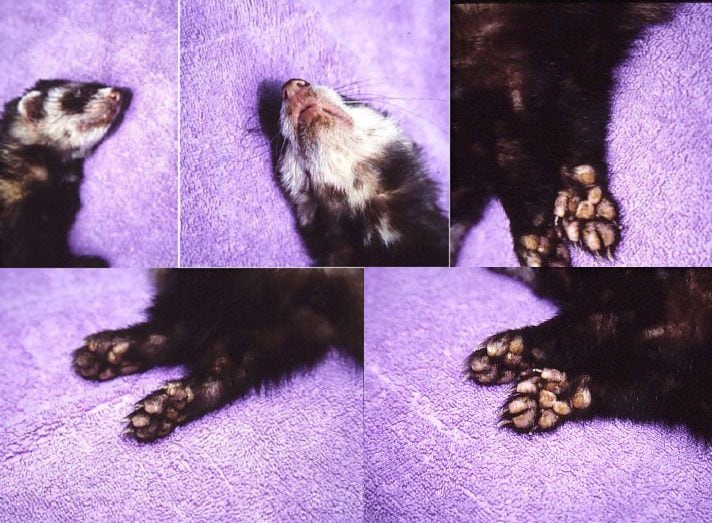Canine distemper is a serious and frequently fatal infection of dogs and other members of the canine family, such as wolves, foxes and coyotes. It is caused by a virus. It can also infect pet ferrets, skunks, mink, badgers, black-footed ferrets and other members of the weasel family. Raccoons and kinkajous are also highly susceptible to this disease. Canine distemper is an almost always fatal disease of pet ferrets. There have been two recent outbreaks of canine distemper involving pet ferrets. One was in a ferret shelter on the West Coast, and the other was in a ferret shelter on the East Coast.
Clinical signs of canine distemper in ferrets start with fever, anorexia, blinking and squinting of the eyes, and a clear liquid discharge from the nose. Within a few days a skin rash develops. The rash usually starts on the ferret’s chin and lips. It will quickly spread to the nose, eyelids and to the inguinal area. This rash may become infected, itchy and turn an orange tint. This rash is very similar to the rash people with measles develop.
As canine distemper becomes worse, ferrets develop a mucopurulent (pus) discharge from the eyes and nose that forms a crust on the nose and eyes. The eyelids will typically become closed and stuck together. Next the foot pads can become thick and hard (hyperkeratosis). Many ferrets will start coughing and show signs of pneumonia. Some of the ferrets will die from the respiratory problems. Ferrets that survive the respiratory stage will likely continue to get worse and start showing neurological signs, such as excessive salivation, muscle twitching — especially the muscles on the top of the head — and seizures. Ferrets that have the neurological signs will almost always die within a few more days.
Fortunately there is a USDA-approved canine distemper vaccine for use in ferrets. It is called Purevax ferret distemper vaccine, and it is one of the ferret supplies manufactured by Merial. For young ferrets, it is recommended to vaccinate them at 6, 9, 12 and 15 weeks of age, following by a yearly booster. For adult ferrets with an unknown vaccine history, it is recommended to give two doses of the vaccine, three weeks apart and then a yearly booster. This vaccine is both safe and effective for ferrets. It can also be used in skunks, raccoons, kinkajous, and other exotic pets. In addition, it is used to protect black-footed ferrets in captivity and in the wild.
For ferrets that come down with canine distemper, treatment with vitamin A, immune modulation with interferon or polyprenyl immunostimulant, broad spectrum antibiotics, and supportive care can be tried. A grave prognosis is still warranted even with treatment, so it is much better to prevent canine distemper through proper vaccination.
Story and photo by: Jerry Murray, DVM
Share:









